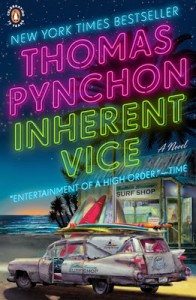 This is supposedly more accessible than Gravity’s Rainbow, the ponderous postmodern exercise for which Pynchon won the National Book Award in 1974, although the Pynchon style is the same. This is a lighthearted detective story, with the PI, Doc Sportello trying to solve a kidnap case that involves a mobster-connected real-estate developer and his girlfriend who is also an ex-girlfriend of Doc’s. Doc is a hippie in the early 70’s who chain smokes joints as he romps through Los Angeles looking for clues. Inevitably, the police pick him up as a suspect, but in the end all is well.
This is supposedly more accessible than Gravity’s Rainbow, the ponderous postmodern exercise for which Pynchon won the National Book Award in 1974, although the Pynchon style is the same. This is a lighthearted detective story, with the PI, Doc Sportello trying to solve a kidnap case that involves a mobster-connected real-estate developer and his girlfriend who is also an ex-girlfriend of Doc’s. Doc is a hippie in the early 70’s who chain smokes joints as he romps through Los Angeles looking for clues. Inevitably, the police pick him up as a suspect, but in the end all is well.
The story is recognizably Pynchonesque, with a cast of hundreds, most wacky, an incredible, convoluted plot that just barely hangs together, infused with a mood of paranoia. Pop-cultural references abound. Characters have playful names that deliberately bump you out of the story, such as Riggs Warbling, Bigfoot Bjornsen, Japonica Fenway, and my favorite, Vincent Indelicato. That is consistent with the silly tone of the book overall.
It is not a serious mystery, because not only is it hard to remember what’s going on and who’s who, but neither Doc nor any other character is well motivated or challenged (maybe that’s the marijuana thing), so the reader actually doesn’t care about the story or the characters. About the only thing keeping you turning the pages are the trenchant descriptions and the humorous, but not-believable dialog.
Doc, making his single allowed call to his lawyer from the jailhouse:
“All’s I get here’s a three-minute, call, Saunch, they’ve got me in Compton, and it’s Bigfoot again.”
“Yeah well, I’m watching cartoons here, okay? And this Donald Duck one is really freaking me out? …
“You have a pen, Saunch? Here’s the processing number, prepare to copy.”…
“It’s like Donald and Goofy, right, and they’re out in a life raft, adrift at sea? for what looks like weeks? and what you start noticing after a while, in Donald’s close-ups, is that he has this whisker stubble? like, growing out of his beak? You get the significance of that?
“If I find a minute to think about it, Saunch, but meantime here comes Bigfoot and he’s got that look, so if you could repeat the number back, OK, and…”
“We’ve always had this image of Donald Duck, we assume it’s how he looks all the time in his normal life, but in fact he’s always had to go in every day and shave his beak. The way I figure, it has to be Daisy. You know, which means, what other grooming demands is that chick laying on him, right?”
The book is really about Thomas Pynchon. It is clever-funny, completely silly, and in the end, unsatisfying. Why that is, I’m not sure.
Inherent Vice is in part, a parody of, or an homage to, the noir detective novels of the 1940’s, in particular, ones by Raymond Chandler, such as “The Big Sleep” and “Farewell, My Lovely,” featuring detective Phillip Marlowe. Yet it isn’t fan fiction. It just sort of wears similar clothes as the Chandler originals, but its structure and voice are definitely derivative.
As a nominal detective novel, not much detecting goes on in IV. There is a nominal plot, a missing businessman and a missing girlfriend, but it’s so disjointed, with so many characters moving on and off stage that readers really can’t follow. When you start out with a detective and a girl in crisis with a missing boyfriend, that tees up a mystery. How long will a reader stick with the book until realizing that the logic of the mystery story is virtually non-existent? I felt cheated somehow.
Yet the writing is so much fun, so original, so unexpected, so genuinely silly (and I love silly), that I had no trouble keeping the pages turning. I guess postmodernism still takes some getting used to.
Pynchon, Thomas (2009). Inherent Vice. New York: Penguin Press.
